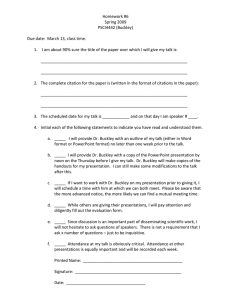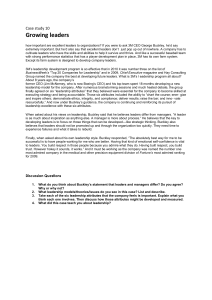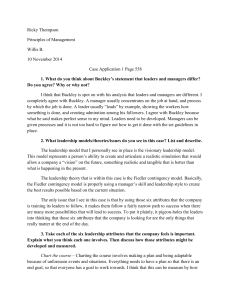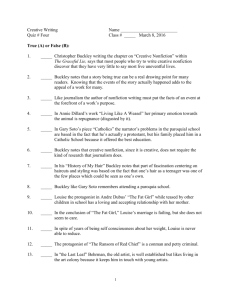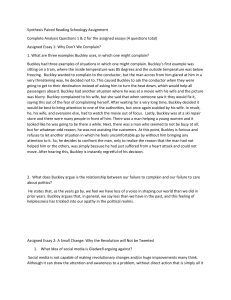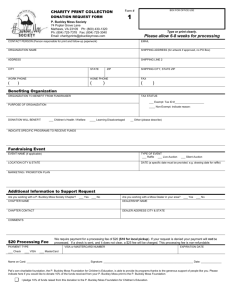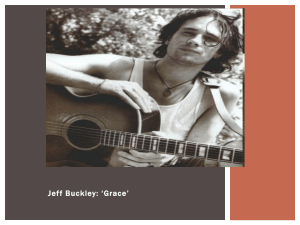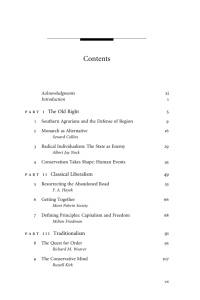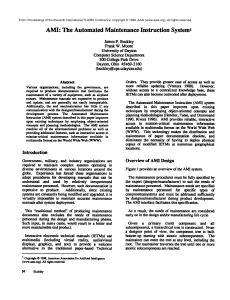Freedom of Speech in America: An Analysis of Buckley's Essay
advertisement
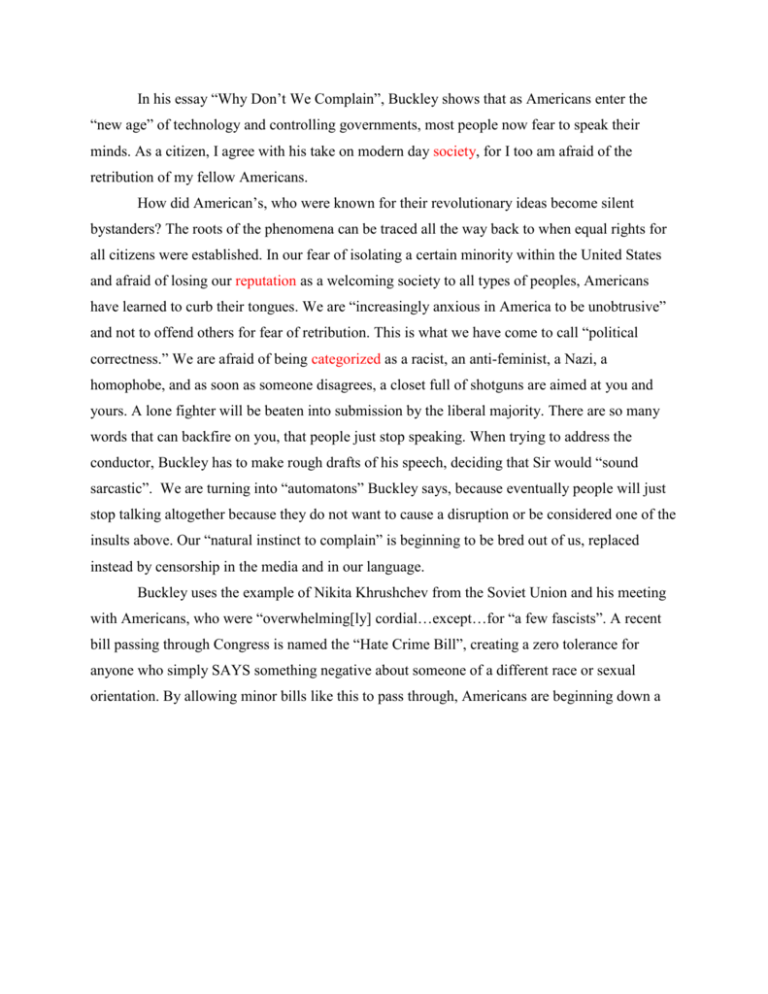
In his essay “Why Don’t We Complain”, Buckley shows that as Americans enter the “new age” of technology and controlling governments, most people now fear to speak their minds. As a citizen, I agree with his take on modern day society, for I too am afraid of the retribution of my fellow Americans. How did American’s, who were known for their revolutionary ideas become silent bystanders? The roots of the phenomena can be traced all the way back to when equal rights for all citizens were established. In our fear of isolating a certain minority within the United States and afraid of losing our reputation as a welcoming society to all types of peoples, Americans have learned to curb their tongues. We are “increasingly anxious in America to be unobtrusive” and not to offend others for fear of retribution. This is what we have come to call “political correctness.” We are afraid of being categorized as a racist, an anti-feminist, a Nazi, a homophobe, and as soon as someone disagrees, a closet full of shotguns are aimed at you and yours. A lone fighter will be beaten into submission by the liberal majority. There are so many words that can backfire on you, that people just stop speaking. When trying to address the conductor, Buckley has to make rough drafts of his speech, deciding that Sir would “sound sarcastic”. We are turning into “automatons” Buckley says, because eventually people will just stop talking altogether because they do not want to cause a disruption or be considered one of the insults above. Our “natural instinct to complain” is beginning to be bred out of us, replaced instead by censorship in the media and in our language. Buckley uses the example of Nikita Khrushchev from the Soviet Union and his meeting with Americans, who were “overwhelming[ly] cordial…except…for “a few fascists”. A recent bill passing through Congress is named the “Hate Crime Bill”, creating a zero tolerance for anyone who simply SAYS something negative about someone of a different race or sexual orientation. By allowing minor bills like this to pass through, Americans are beginning down a slippery slope in which the “centralized political power” is taking away all our rights. Another perfect example is this past election between candidates in the Democratic party. One was a female, and another was African American. Saturday Night Live did a wonderful job of satirizing the voters during the primaries. If you did not vote for the female, you could be considered an anti-feminist, whereas not voting for the African-American made you a racist. Either way, you were categorized as something that has been given a negative connotation by society and which has been spread through our increased, heavily biased media coverage. Media is the best example of how technology affects the everyday life of an American. Commuters listen to the news on their way to work and families watch the evening news as they eat dinner at night. This is what brings the world into the home, everything from terrorist attacks to a missing dog can be fit into an hour long broadcast. In fact, the KYW radio station’s slogan says “You give us fifteen minutes, we’ll give you the world”, and we foolishly believe them. As if all the events of the nation can be fit into the short time period, it shows America’s impatience. Stories that should be sensational rarely affect people anymore, and not only are we emotionally apathetic Buckley says also, “our notorious political apathy is a related phenomenon.” This can be explained by the catchphrase above. In the editor’s attempt to fit only the truly important information into fifteen minutes, he leaves out many other stories and often takes quotes out of context. This gives the station a decidedly biased viewpoint on which segments they choose to cut or put in. FOX News is one of the few conservative news stations that favor Republicans, and the other major stations are more liberal and support many of the actions of Democrats. The problem is that Americans can group these stations into parties: news should be neutral, and show both sides of the story. Instead, they have been converted into a type of governmental propaganda. Technology makes us even more passive. Buckley explains that the “technification of life” takes away “our direct responsibility for our material environment”, and when we do not understand how things work or how they are made, it seems that we no longer have a right to demand it be done differently. Our power over the products we buy creates an “alienation of personal power”, and we believe that we should not meddle in things we don’t fully understand. Instead we wait for someone else to fix it, an “expert” who knows the problem better and can come up with a more educated solution, because we are not qualified to handle the situation. This carries over into the world of politics. Therefore we are slowly handing over our freedom to make choices to “a powerful government whose hold upon us” gets stronger every time we pass over the opportunity to speak our mind. Communism and socialism are examples of these governments which take over and try to control every aspect of their citizens’ lives, for the ‘betterment of the society’. Buckley is trying to compare America’s ‘democratic’ government to these examples. Recent news reports can back up his theory. President Obama’s health care plan, taking something that has long been in the hands of citizens and putting it in the charge of a few choice officials and trying to follow Europe in its socialistic movement. The bank bailouts and the buying of American companies like GMC are all examples of how “more power drains away from the individual to…far-off places”, and since we do not speak out against it, we are becoming helpless and “less say about the shape of events that shape our future”. If Americans want to keep their freedom secure, they must speak out and break this spell of silence, and go against the grain of the majority of the citizens who prefer quietly letting someone else handle the problem. Someone must speak out and campaign for a change. Yet how can Americans speak up, when the media, our best chance at being heard, will not listen, especially if your view is different than what they preach? Or how can we talk to someone in charge when all phone calls are answered by prerecorded messages? Leaders we elect to represent us no longer bother to listen to voters’ reasons, instead they are so caught up in their battle for political gain within Congress that representation barely exists any longer. The technology we created to advance our lives now has isolated us from having a chance to make our voices heard. This creation called technology that was once considered a blessing has robbed us of what our Founding Fathers fought so hard for; freedom of speech. It has now become a curse. This alarming trend of disintegrating individual power goes unnoticed by many of the Americans that walk the streets. The percent of the population of people who think like the revolutionist Thoreau who said “The government that governs best, governs least” are declining steadily, and Patrick Henry’s words “Give me liberty or give me death” are not as immortal as we once believed. We are failing to see that freedom of speech is yet again becoming a figment of the imagination, and a dream that once lost, can rarely be regained.
